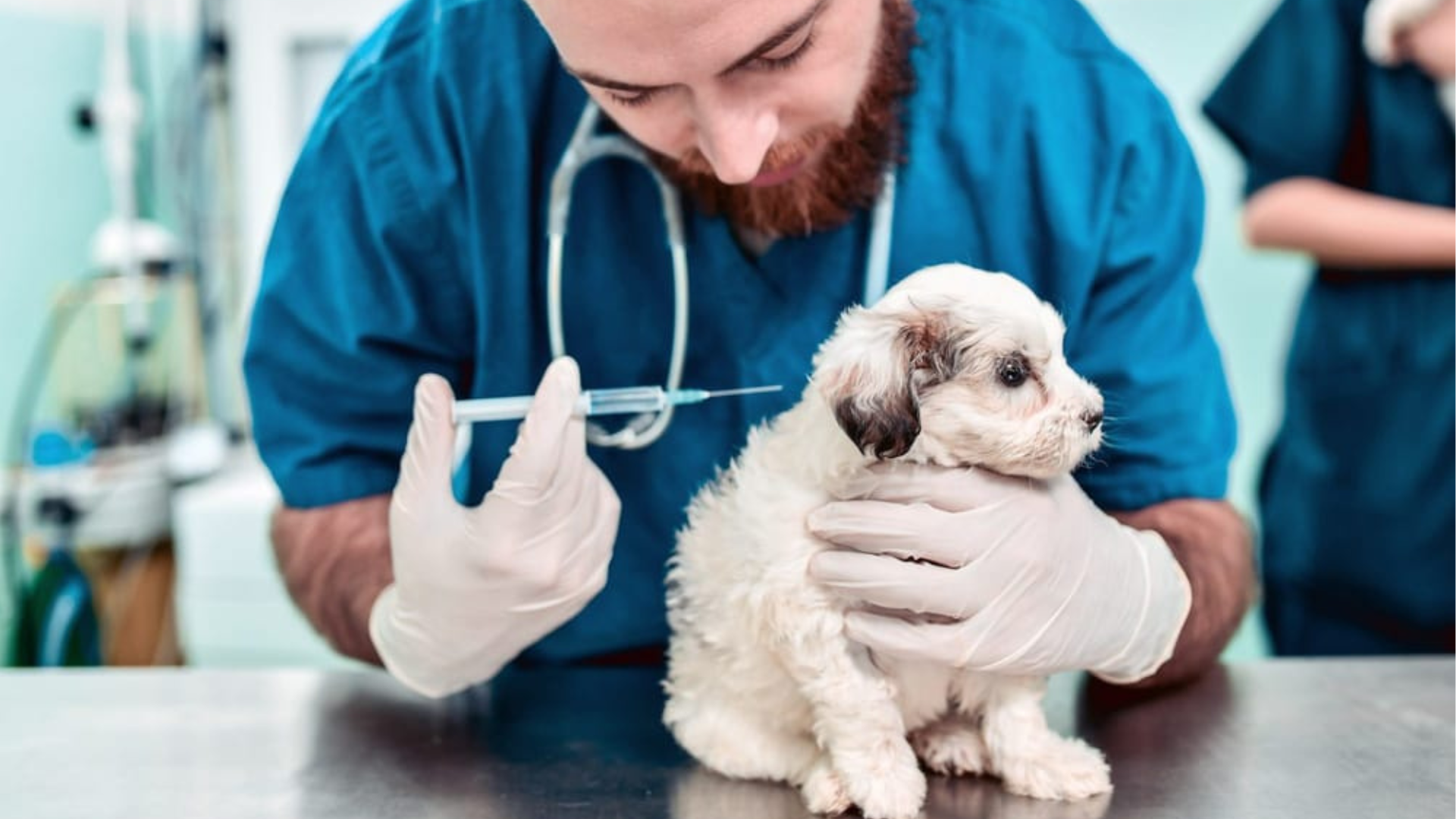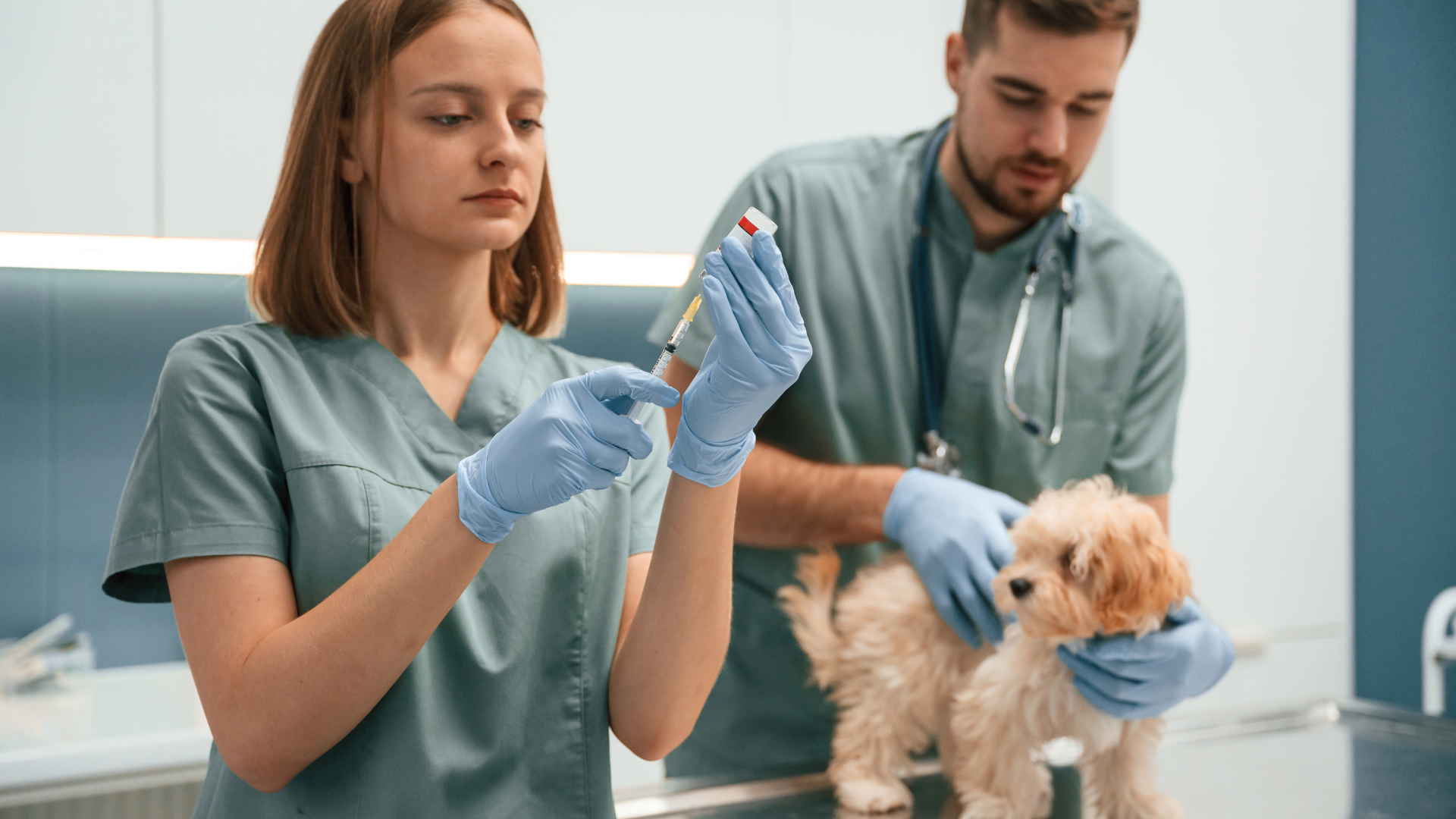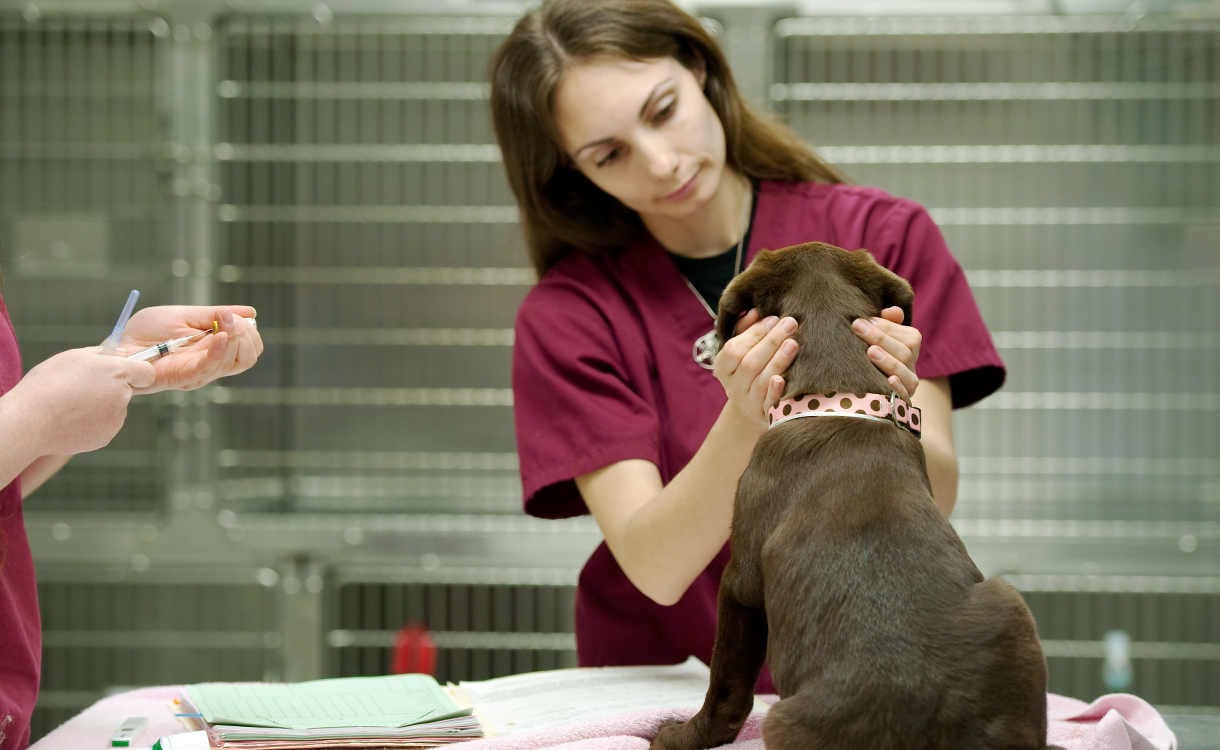Puppies are adorable and playful creatures that bring joy to many households. However, as with any new addition to the family, ensuring their health and safety is of utmost importance. One of the first steps in caring for a new puppy is getting them their first shots.

The first shots for puppies, also known as core vaccines, protect them from common and potentially fatal diseases such as distemper, parvovirus, and rabies. These vaccines are typically given when the puppy is between six and eight weeks old, with boosters given every few weeks until they are around 16 weeks old. After that, the puppy will need regular vaccinations throughout their life to maintain immunity.
It is important to note that while core vaccines are necessary for all puppies, there are also non-core vaccines that may be recommended based on the puppy's lifestyle and risk factors. These can include vaccines for diseases such as Lyme disease or bordetella (kennel cough). Consulting with a veterinarian can help determine which vaccines are necessary for a specific puppy.

Importance of Vaccination
Vaccination is an essential aspect of a puppy's health care routine. It is a preventive measure that protects puppies from various diseases. Vaccines contain antigens that stimulate the immune system to produce antibodies, which help fight off specific diseases. In this section, we will discuss the importance of vaccination for puppies.
Preventing Disease
Vaccination is crucial in preventing diseases that can be fatal to puppies. Puppies are born with an immature immune system, making them more vulnerable to infections. Vaccination helps protect puppies from diseases such as parvovirus, distemper, hepatitis, and rabies, which can be deadly if left untreated. By vaccinating puppies, pet owners can ensure that their furry friends are protected from these diseases.
Building Immunity
Vaccination not only protects puppies from specific diseases but also helps build their immunity. Vaccines contain antigens that stimulate the immune system to produce antibodies. These antibodies help protect puppies from future infections. Vaccination also helps puppies develop immunity to diseases that they may encounter later in life. By vaccinating puppies, pet owners can ensure that their furry friends have strong immunity to fight off diseases.
In conclusion, vaccination is an essential aspect of a puppy's health care routine. It helps prevent diseases and build immunity, ensuring that puppies stay healthy and happy. Pet owners should consult their veterinarian to develop a vaccination schedule that is appropriate for their puppy's specific needs.
Initial Vaccination Schedule
When it comes to puppies, getting their initial vaccinations is an important step in ensuring their long-term health. Below is a breakdown of the initial vaccination schedule that puppies should follow.
First Veterinary Visit
The first veterinary visit should occur when the puppy is between 6 and 8 weeks old. During this visit, the veterinarian will perform a physical exam and administer the first round of vaccinations.
Core Vaccines
Core vaccines are those that are recommended for all puppies. These vaccines protect against highly contagious and potentially fatal diseases. The core vaccines that puppies should receive include:
- Canine distemper
- Canine parvovirus
- Canine adenovirus
- Rabies
Puppies should receive their first round of core vaccinations at 6-8 weeks old, with subsequent boosters administered every 3-4 weeks until they are 16 weeks old.
Non-Core Vaccines
Non-core vaccines are recommended based on a puppy's lifestyle and risk of exposure to certain diseases. These vaccines include:
- Bordetella (kennel cough)
- Leptospirosis
- Lyme disease
- Canine influenza
Puppies should receive their first round of non-core vaccinations at 10-12 weeks old, with subsequent boosters administered every 3-4 weeks until they are 16 weeks old.
It is important to note that some non-core vaccines may not be necessary for all puppies. Owners should consult with their veterinarian to determine which non-core vaccines their puppy should receive based on their individual circumstances.
Following the initial vaccination schedule is crucial in protecting puppies from potentially life-threatening diseases. By staying up-to-date on vaccinations, owners can help ensure their puppy lives a long and healthy life.
Vaccine Types and Their Purposes
Live Attenuated Vaccines
Live attenuated vaccines contain weakened forms of the virus or bacteria that cause the disease. These vaccines are able to stimulate a strong and long-lasting immune response in puppies. One of the advantages of live attenuated vaccines is that they provide a more complete immunity to the disease than other types of vaccines. However, they may not be suitable for all puppies, especially those with weak immune systems. Some common live attenuated vaccines for puppies include the distemper, parvovirus, and adenovirus vaccines.
Inactivated Vaccines
Inactivated vaccines, also known as killed vaccines, contain viruses or bacteria that have been killed or inactivated. These vaccines are safe for all puppies, including those with weak immune systems. However, they may require multiple doses to provide complete immunity. Inactivated vaccines are less effective at stimulating the immune system than live attenuated vaccines, but they are still an important tool in preventing diseases. Some common inactivated vaccines for puppies include the rabies and leptospirosis vaccines.
When choosing a vaccine for a puppy, it is important to consult with a veterinarian to determine the appropriate vaccine schedule and type of vaccine. Vaccine schedules may vary depending on the puppy's age, breed, and overall health. By vaccinating puppies, pet owners can help protect them from serious and potentially life-threatening diseases.
Preparing for Vaccination

Puppy's Health Evaluation
Before getting vaccinated, it is important to evaluate the puppy's health condition to ensure he or she is ready for the shots. A veterinarian should examine the puppy to check for any underlying medical conditions that may affect the vaccination process. The vet will also consider the puppy's age, breed, and lifestyle to determine the appropriate vaccination schedule.
Pre-Vaccination Guidelines
There are several guidelines to follow before getting the puppy vaccinated. These guidelines will ensure the puppy is healthy and ready for the shots. Some of the pre-vaccination guidelines include:
- Deworming: Puppies should be dewormed before getting vaccinated to ensure their immune system is strong enough to handle the vaccine.
- Healthy diet: A healthy diet is essential for the puppy's overall health. A balanced diet will provide the necessary nutrients to help the puppy's immune system function properly.
- Avoid stress: Stress can weaken the puppy's immune system, making him or her more susceptible to infections. It is important to avoid stressful situations before and after vaccination.
By following these guidelines, the puppy will be in the best possible condition to receive the first shots. It is important to consult with a veterinarian to ensure all necessary precautions are taken before getting the puppy vaccinated.
Post-Vaccination Care
After receiving their first shots, puppies require some post-vaccination care to ensure their health and safety. Here are some important things to keep in mind:
Monitoring for Reactions
It is important to monitor your puppy for any adverse reactions after receiving their first shots. While reactions are rare, they can occur and can range from mild to severe. Signs of a reaction may include:
- Swelling or redness at the injection site
- Lethargy or lack of appetite
- Vomiting or diarrhea
- Difficulty breathing or swelling of the face
If you notice any of these symptoms, contact your veterinarian right away. They can advise you on the best course of action and may recommend bringing your puppy in for further evaluation.
Follow-Up Shots
Most puppies will require follow-up shots to ensure they are fully protected against common diseases. Your veterinarian will advise you on the recommended schedule for follow-up shots based on your puppy's individual needs.
It is important to stay up-to-date with your puppy's vaccinations to ensure they are protected against disease. Missing a scheduled shot can leave your puppy vulnerable to illness and may require restarting the vaccination process.
By following these guidelines for post-vaccination care, you can help ensure your puppy remains healthy and protected against common diseases.
Legal and Ethical Considerations
Vaccination Laws
In most states, it is mandatory for puppies to receive their first set of vaccinations by a certain age. These laws are in place to protect not only the puppy but also other dogs and humans that may come into contact with the puppy. The specific vaccinations required may vary by state, but typically include core vaccines such as rabies, distemper, and parvovirus.
It is important for puppy owners to research and understand the vaccination laws in their state to ensure compliance. Failure to comply with these laws can result in fines and legal consequences.
Responsible Ownership
In addition to complying with vaccination laws, responsible puppy ownership also involves ensuring that the puppy receives proper veterinary care and socialization. This includes regular check-ups, preventative care such as flea and tick medication, and training to prevent behavioral issues.

Puppy owners should also be aware of the potential risks associated with vaccinations and discuss any concerns with their veterinarian. While rare, adverse reactions to vaccines can occur, and it is important for owners to be informed and prepared.
Overall, vaccination laws and responsible ownership go hand in hand in ensuring the health and well-being of puppies. By following these guidelines, puppy owners can help protect their furry friends and the community as a whole.
Conclusion
In conclusion, ensuring that your puppy receives their first shots is an essential part of responsible pet ownership. By vaccinating your puppy against common diseases, you are not only protecting their health but also contributing to the overall well-being of the canine community. Remember to work closely with your veterinarian to develop a vaccination schedule tailored to your puppy's specific needs. By prioritizing vaccinations and providing post-vaccination care, you can give your furry companion the best chance at a happy, healthy life.
Frequently Asked Questions

- When should puppies receive their first vaccinations?
- Puppies should receive their first vaccinations between 6 and 8 weeks of age. This is when maternal antibodies start to decrease, leaving puppies vulnerable to diseases. It is important to note that puppies should not be vaccinated before 6 weeks of age, as their immune system is not yet developed enough to respond to the vaccine.
- What vaccinations are included in the initial puppy shots?
- The initial puppy shots typically include vaccinations for distemper, parvovirus, adenovirus, and parainfluenza. These vaccinations are commonly referred to as the "core" vaccinations, as they protect against the most common and dangerous diseases.
- How often do puppies need to be vaccinated after their first shots?
- After the initial puppy shots, puppies will need to be vaccinated every 3-4 weeks until they are 16 weeks of age. This is to ensure that they build up a strong immune system and are fully protected against diseases. After the 16-week mark, puppies will need to receive booster shots at regular intervals throughout their life.
- What is the average cost of initial vaccinations for puppies?
- The cost of initial vaccinations for puppies can vary depending on the location and the veterinarian. On average, the cost of initial vaccinations can range from $75 to $100. It is important to note that the cost of vaccinations is a small price to pay compared to the cost of treating a sick puppy.
- Is it safe to administer the first vaccines to puppies at home?
- Administering vaccines to puppies at home is not recommended. Vaccines need to be stored and handled properly, and administering them incorrectly can lead to serious health issues. It is important to take puppies to a licensed veterinarian for their vaccinations.
- What are the risks of not vaccinating puppies on schedule?
- Not vaccinating puppies on schedule can lead to serious health issues, including death. Puppies are vulnerable to diseases, and delaying or skipping vaccinations can leave them unprotected. It is important to follow a vaccination schedule to ensure that puppies are fully protected against diseases.




